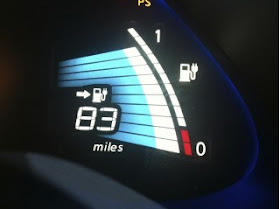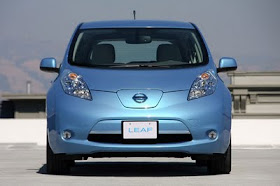 |
| The 2011 Nissan Leaf. Park one next to a Juke and contemplate automotive styling. |
 |
| The interior of the 2011 Nissan Leaf: Futuristic, but functional. |
It's a very nice, modern car. Not terribly gimmicky, yet with enough dashes of obvious tech here and there to remind you of your cutting-edge status. It drives well, is surprisingly quick, very quiet (no gasoline motor noise, for one), and is roomier inside than the outside suggests (the Nissan Tardis?)
$33,720 puts one in your driveway (our tester, with optional splash guards, ECO Design Package..that's the decals on the doors, Hologram 3D door entry plates and center console applique'...Protection Package, floor mats and cargo area mat, cargo net and safety kit, came to $35,430 with destination charges...but subtract the $7,500 tax credit and you're at $27,930).
Better yet, let that money put it in your garage, where hopefully you'll have the optional ($2,200) 240 volt charging station installed. The advantage...the ability to fully recharge a very-nearly-drained Leaf in just 7 hours. Use the charger that stashes in the trunk and hooks up to your household 120V current and it'll take 14.
 |
| Like optimism? You'll love the 2011 Nissan Leaf's range meter. |
Nissan's early PR for the Leaf suggested a 100 mile range was attainable. The EPA, however, doesn't agree, and has issued a 73 mile estimated range on a full charge. Even that, though, can be optimistic. How you're driving, whether you're using the air conditioning, and things beyond your control such as traffic patterns, can all affect your range.
When the Leaf was dropped off for our test, it showed what the picture shows above...83 miles. But a 15-mile roundtrip from my office to run an errand brought that down to 57. No problem. I'd made arrangements with the building supervisor for a parking space next to a 120V outlet in the company garage. I'd get six hours worth of charge (not quite enough to get it to full, but giving me a comfortable cushion for the 25 mile drive home that evening).
Except.
The Leaf kept tripping the circuit breaker. Turned out to be the outlet's fault, not the car, but it meant no charge, and a drive home in rush hour with no more juice than was in the car.
57 minus 25 is 32. But the Leaf showed only a 19 mile range by the time I pulled into my driveway that evening....and it was estimating a 14-hour full recharge on household current. More trouble. I'd just finished a double shift. It was 7PM. I needed to leave for work at 4AM. That's only 9 hours of charging time. I left the next morning showing 55 miles on the range meter, with a 25 mile drive (same as last night, just the other direction). Good news...it wasn't rush hour. Bad news...it wasn't rush hour. What that means is that while there wasn't much unpredictable about 4AM traffic, it also meant running 65 miles per hour on the freeway, which eats the charge quicker than say, 40 or 45.
The range meter showed 22 when I got to work. Thankfully, the building supervisor had sent an email. A good outlet had been located and blocked off for the Leaf. The bad news? The Leaf again needed 14 hours on 120V household current, and I was only going to be at work for 8.
 |
| The panel around the Nissan logo on the 2011 Leaf? That's the flap that opens for the charger. |
This could have gone on forever, but Nissan scheduled a short loan. They dropped it with me at noon on Thursday, and picked it up the following Monday morning. So I finally got a full charge between 1PM and 3AM Friday afternoon/Saturday morning, but I wasn't commuting on Saturday and Sunday. I drove it for errands through the weekend on that one charge. And after giving it a full charge Sunday afternoon until 4AM Monday, I drove it to work and Nissan came and picked it up.
So what did we learn? A few things:
1. The Leaf is a much better electric car than the General Motors EV-1 of the 1990s, a car whose range meter could go from 80 miles to 45 in just three miles. It is far more comfortable, carries more people and their possessions and is simply more practical.
2. If you drive more than 10 miles one way to work in a day, spend the $2200 for the 240V charger for your house. You'll have a full charge when you leave each morning and reserve power for lunch runs and unforseen emergencies.
3. If you drive more than 25 miles one way to work in a day, seriously consider doing whatever it takes to get a second 240V charger installed where you work. Again, a full charge in the morning, a full charge to get home on and reserve power for the stuff that comes up. If you can't make a 240V work charger happen, think twice about the Leaf.
4. If you ever have days where you drive more than 75 or 80 miles, or if your life or job are simply unpredictable in terms of how much and where you might have to drive at any given time, there's probably a better option for you.
Still, purely electric vehicles have a place in the future of the automobile, and there's no doubt Nissan will improve and refine the Leaf as battery technology improves. It's a good car, a commendable effort, and for some drivers, a solid choice.